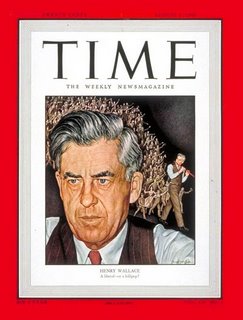Henry A. Wallace

"Wallace was really too naive for a hard world." -- Arthur Schlesinger, Jr.
As an economist and crop scientist who spoke at least four foreign languages passably well, Henry A. Wallace cast a singular silhouette in 20th century American politics.
Born on this day in 1888 in Adair County, Iowa, the son of Henry C. Wallace -- a dairying professor, founding editor of Wallace's Farmer and U.S. secretary of agriculture under Presidents Harding and Coolidge -- young Henry developed an interest in plant science under the influence of one of his father's students, George Washington Carver. From his teens onward, Wallace worked in his own private agronomy laboratory breeding new crops, pausing occasionally to deliver lectures on advanced statistics to the faculty at Iowa State and to write for the Farmer. In 1923, he developed the first commercially viable strain of hybrid corn (more than doubling the per acre yields of Midwestern corn), which he sold through his Pioneer Hi-Bred Seed Company.
Wallace's frustration with the Republicans' lack of interest in agricultural issues led him to begin supporting the Democrats in 1928, and when Franklin Roosevelt won the presidency in 1932, he rewarded Wallace by appointing him secretary of agriculture. From this post Wallace became one of the most enthusiastic "New Dealers," campaigning for the passage of the Agricultural Adjustment Act of 1933 (later augmented by the Soil Conservation Act of 1935 to enable the policy to pass constitutional muster) to help end the family farm crisis by paying farmers to reduce crop output (thus helping to support prices for actual output), as well as for the Federal Crop Insurance Program (1938), the food stamp program (1939) and the school milk program (1940).
Roosevelt admired Wallace, and Wallace was his only choice for vice-presidential running mate for the 1940 campaign. As vice president he did not enjoy particularly good relations with the Senate (perhaps his accidental knockout of Senator Allen Ellender in a friendly intramural boxing match didn't help matters) or with the members of Roosevelt's cabinet (in his role as chair of the economic defense board, he locked antlers with secretary of commerce Jesse Jones as Wallace attempted to increase the level of governmental involvement in building supply stockpiles); but he joined Roosevelt in his vision of American involvement in World War II as an opportunity for creating a post-war international peace mission.
In 1943, he visited Latin America, addressing the public in short Spanish sentences (speaking the language as well as Xavier Cugat could speak English, according to film actress Margo); and in the following year, Roosevelt sent him to China and the Soviet Union. Wallace returned from the latter trip as an enthusiastic supporter of the Russian people and some aspects of Soviet economic policy. His public remarks sent chills up the spines of pre-Cold War anti-Communists, who demanded that Roosevelt dump him from the ticket in 1944. The move was fateful, as shortly after the election, Wallace's replacement, Harry Truman, became president when Roosevelt died in 1945. Although Roosevelt appointed Wallace secretary of commerce as a consolation prize, Truman dismissed him in 1946 after Wallace gave a speech criticizing U.S. policy relating to the Soviet Union after World War II.
Originally hoping to challenge Truman for the Democratic presidential nomination in 1948 in the name of world peace and human rights, in 1947 he announced his candidacy under the banner of the Progressive Party. The U.S. Communist Party immediately lent its support by nominating Wallace as its candidate, doing an about-face from its pro-Democratic Party/low-profile policy during World War II as a result of Truman's anti-Soviet stance; against his advisors' counsel, Wallace failed to disavow the Communists, sending most Democratic Party progressives, including the leaders of organized labor, back to Truman. With mainstream America believing that he was pro-Soviet if not anti-American, as well as with the disclosure of his relationship with the late Russian yoga guru Nicolas Roerich when a series of "Dear Guru" letters were leaked to the press, Wallace's campaign failed to have much of an impact: running 4th behind Truman, Dewey and Strom Thurmond, Wallace received just 1,157,140 votes, or a little over 2% of the popular vote, as Truman was re-elected.
Wallace continued to lead the Progressive Party until 1950, when his optimism about the Soviets was finally tarnished by their record of intervention in Eastern Europe. He retired to his farm in South Salem, New York, raising chickens, strawberries and gladioli until succumbing to Lou Gehrig's Disease on November 18, 1965.





0 Comments:
Post a Comment
Subscribe to Post Comments [Atom]
<< Home